How To Kill Mosquito Larvae – 8 Tips That Work
-
Cheryl Regan
- Last updated:
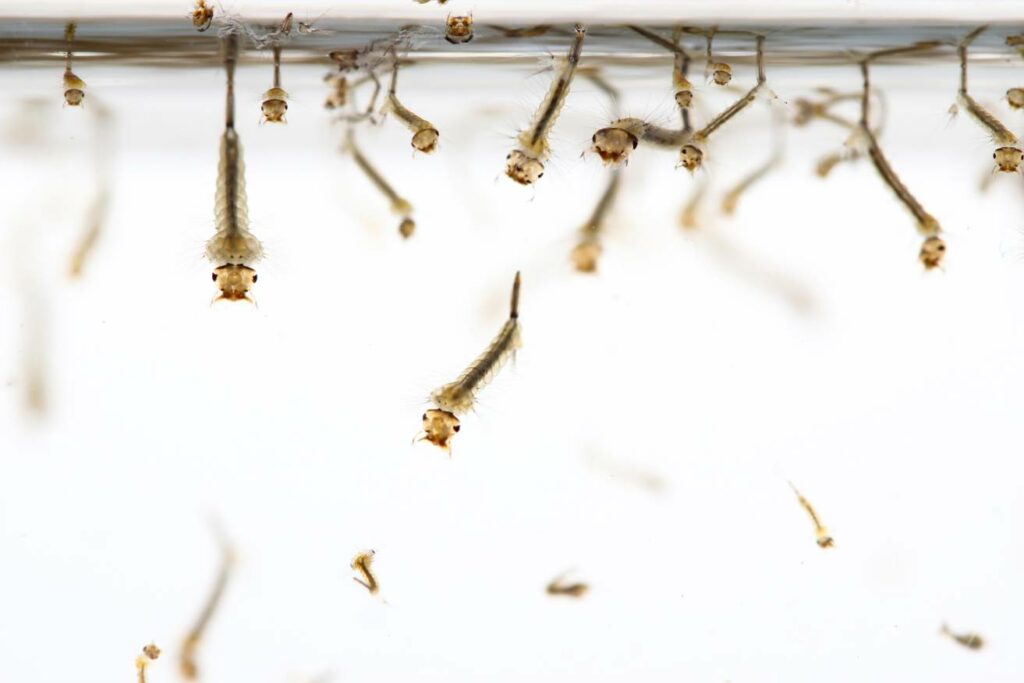
If the entire population of the Earth has one thing in common, it’s probably this: nobody likes mosquitoes. Aside from the skin-crawling sensation they cause when they buzz around our heads—not to mention itchy bites that last for days—mosquitoes also carry diseases, such as the Zika, West Nile, and Yellow Fever viruses.
After feeding, mosquito females lay their eggs in stagnant water. Soon after, the eggs hatch into larvae. This is the best time to exterminate mosquitoes—before they get wings!
In this article, we’ll share 8 tips and tricks on how to kill mosquito larvae.
How to Kill Mosquito Larvae
1. Throw Out Stagnant Water
Prevention is often better than the cure, or so the saying goes when it comes to health—and it’s no different for mosquito larvae. Mosquitoes lay their eggs in shallow stagnant water—even an ounce of water is enough for them to breed.
When water pools on the inside of tires, kids’ playhouses, pet bowls, and bird baths, it creates the perfect breeding spot for mosquitoes. If you’ve had recent rain, walk around your backyard and dump out any stagnant water!
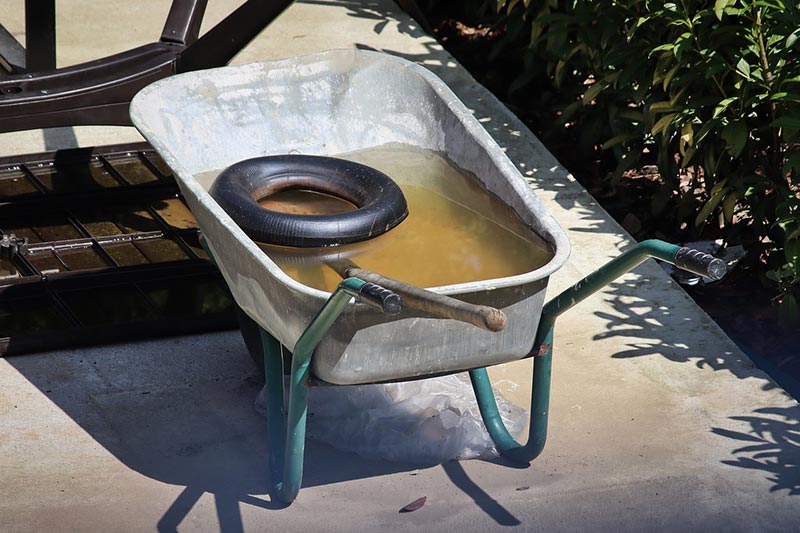
2. Dish Soap or Shampoo
If you were worried that you’d have to splurge to get rid of mosquito larvae, don’t! Even everyday humble household items should do the trick.
You’ll need one drop of dish soap or shampoo per gallon of water. Mix it in, and it should be enough to suffocate the mosquito larvae. For 50 gallons of water, you’d need 50 drops of soap, and so on.
There is a downside, unfortunately. If you were planning to use this method on a pond that has fish in it, this would be a bad idea. Dish soap and shampoo will harm your fish as much as it will harm mosquito larvae.
3. Olive or Vegetable Oil
Oil works in the same way as dish soap in that it will suffocate the mosquito larvae before they have the opportunity to grow wings and bite you. Simply spray oil into the water until there’s a glossy film all across the surface.
The next time the mosquito larvae come up for air, the oil will block their airway and smother them. Unfortunately, this method will stop any fish you have from breathing too, so do not use this method for fishponds!

4. Apple Cider Vinegar
This option is good for eliminating mosquito larvae from drinking water, as apple cider vinegar is safe for humans to consume. The downside is that you’ll need a lot of vinegar depending on how much water you want to treat. As a rule, you’ll need around 15% vinegar to 85% water.
It takes apple cider vinegar around 18 hours to kill off the mosquito larvae. Please note this is not a safe option for fishponds, as the vinegar will likely harm your fish, too.
5. Use Bleach
Chlorine bleach is toxic to almost everything living, so if you pour it into the water, it will kill the mosquito larvae.
The downside is that bleach will kill everything else, too, including any fish or plants you may have in the vicinity. If animals, such as birds or cats, are likely to drink from the water, please remember that bleach would harm them.
Bleach may be especially useful in cleaning out gutters from mosquito larvae.
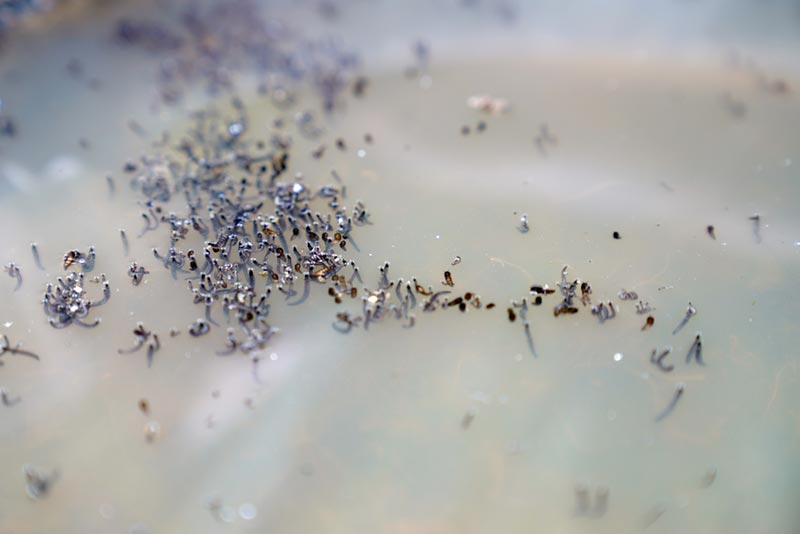
6. Use Larvicides
Larvicides are guaranteed to kill mosquito larvae, and although larvicides are usually toxic to humans, there are many varieties that are safe for fish, making them the perfect option if you want to treat a koi or goldfish pond.
Larvicides come in various forms, but the ones used for mosquito larvae are usually dunks, which include tablets, bits, pellets, granules, and briquettes. Each dunk should last around a week. Just make sure to follow the directions on the packet, and don’t forget to wash your hands after handling larvicides.
7. Install a Pump and Filter
Mosquitoes lay their eggs in still water, so if you have a pool or a pond, it might be a good idea to install a system to prevent the water from becoming stagnant.
A pump and filter system will pull the water and transport it through a filter that will remove debris, dirt, and bacteria, before returning it to the pond or pool. This will keep the water moving, aerate it, and keep your pond or pool looking clean and pristine at all times!
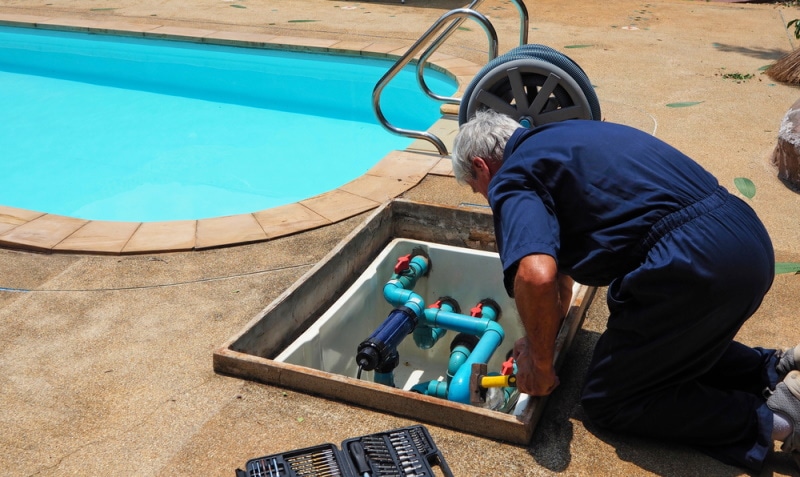
8. Keep Vegetation Trimmed
Mosquitoes like areas with tall vegetation and grass, especially by pools and ponds. If you want to discourage mosquitoes from coming into your backyard, it’s a good idea to keep all vegetation and grass nice and low.
Cutting your grass and plants low will make your backyard a tidier place overall, but it will also help you identify areas where water has pooled that you may not have otherwise seen. Remember that water may be present under piles of leaves and cut grass too, so make sure you get rid of these as well.
Frequently Asked Questions
Will Salt Kill Mosquito Larvae?
Some people believe that salt kills mosquito larvae, however, this is not always a reliable method. The downside to using salt is that you’d need more than a 5% salt-to-water ratio. You’d also need to make sure the salt entirely dissolves in the water.
All in all, even if it does work, salt is not an efficient way to kill mosquito larvae.
How Long Is the Mosquito Larvae Stage?
Depending on the temperature of the water they’re in, and their access to food, mosquito larvae remain in this stage for 4 to 14 days. As they eat, the larvae outgrow their exoskeleton and form a new one.
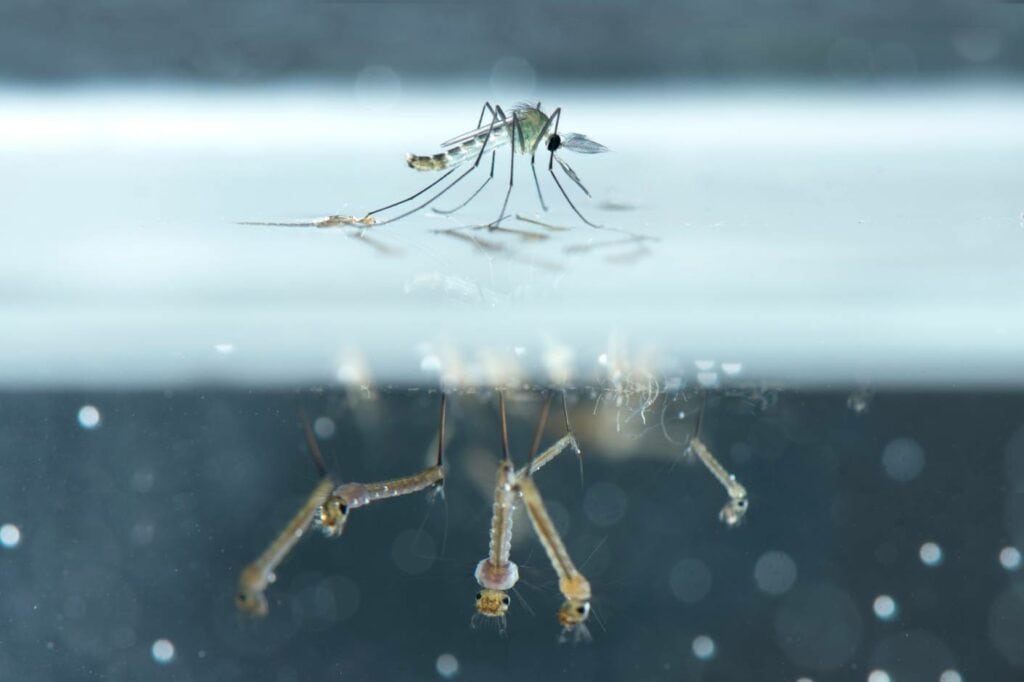
Can Mosquito Larvae Survive in Moving Water?
Mosquito larvae breathe through a snorkel-like body part called a “siphon”, which is located on their rear end. In stagnant water, they use the water’s natural surface tension to attach for breathe using their siphon.
In moving water, it becomes almost impossible for the larvae to attach their siphons to the water surface, and so they suffocate.
In Conclusion
Mosquito larvae are not nice to deal with, but they are easier to deal with than adult mosquitoes!
Depending on the purpose of the water you are trying to treat, think about which option is safest for you to use. And remember, the best way to deal with mosquito larvae is to prevent adult mosquitoes from laying their eggs in the first place.
Featured Image Credit: Napat, Shutterstock
Contents

